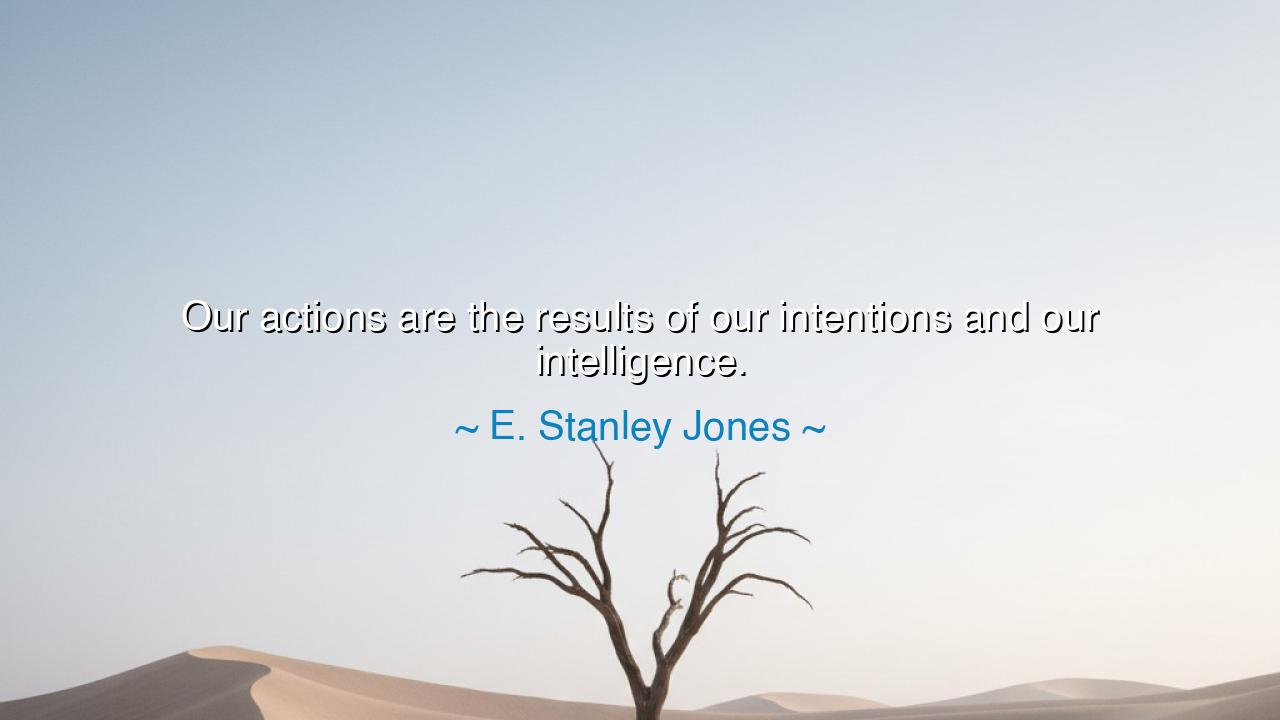
Our actions are the results of our intentions and our






In the luminous and discerning words of E. Stanley Jones, the missionary, philosopher, and seeker of divine truth, we find a revelation that reaches to the heart of human behavior: “Our actions are the results of our intentions and our intelligence.” Within this brief yet profound statement lies the anatomy of choice — the eternal balance between what we desire and how we think. Jones, whose life was dedicated to the meeting of faith and reason, reminds us that what we do in the world is never accidental. Every deed springs from the soil of the inner life, watered by the purpose of the heart and guided by the wisdom of the mind.
The origin of this quote arises from Jones’s lifelong contemplation of the human soul in motion. As a missionary in India during the early 20th century, he saw that transformation — whether spiritual, social, or moral — could never be forced from without. It must arise from within. He observed that the outer world is the mirror of our inner state: actions reveal the intentions of the heart, and those intentions are refined or corrupted by the intelligence that shapes them. In his writings, Jones sought harmony between thought and purpose — for he believed that a pure heart without wisdom is powerless, and wisdom without goodness is perilous.
To understand his meaning, we must first look at the relationship between intention and action. Every human act, from the smallest kindness to the gravest cruelty, begins as an intention — a seed in the hidden garden of the will. But not every seed bears fruit worth keeping. Some intentions are noble yet misguided; others are clever yet selfish. Thus, intelligence becomes the gardener — discerning, pruning, directing the energy of our intentions toward what is just and fruitful. Without intelligence, intention is blind. Without intention, intelligence is cold. The union of the two gives birth to right action, the cornerstone of a virtuous life.
History offers many who embodied this truth. Consider the life of Mahatma Gandhi, who, like Jones, found his calling in India. Gandhi’s intention was clear — to free his people without violence, to show the world that peace could conquer oppression. Yet it was his intelligence, his strategic understanding of human nature and power, that made his intention effective. Had his heart been pure but his mind untrained, his dream would have faded like mist. Had his mind been sharp but his intention corrupt, his leadership would have become tyranny. In him, purpose and wisdom walked together, and through that union, action became transformation.
Jones’s insight also teaches us humility. If our actions are shaped by both intention and intelligence, then failure is not merely fate — it is a lesson in balance. When our good intentions fail, we must ask whether our intelligence was lacking; when our cleverness harms others, we must question whether our intentions were pure. In this, Jones echoes the wisdom of the ancients — the philosophers and prophets who taught that true power lies in the harmony of heart and mind. To act rightly is not merely to think clearly, nor merely to feel deeply, but to unite both in the service of truth.
This teaching is not only for saints or sages — it is for every soul who walks through the world making choices each day. The parent shaping a child’s heart, the leader guiding a people, the artist creating beauty — all act from intention and intelligence. If we wish our deeds to uplift rather than harm, we must cultivate both purity of purpose and clarity of thought. The one without the other leads to ruin: intention without understanding creates chaos; intelligence without conscience breeds cruelty.
Therefore, O seeker of wisdom, take this lesson as your guide: examine your intentions, sharpen your intelligence, and let your actions arise from their union. Before you act, ask yourself — is my purpose rooted in love, and is my understanding clear? Do not rush into the world driven only by passion, nor retreat into thought untouched by compassion. Strive always for harmony between the fire of the heart and the light of the mind.
And so, as E. Stanley Jones teaches, our actions are the outward reflection of our inner balance. To act wisely, one must feel deeply. To act purely, one must think rightly. Let your deeds be the harmony of both, and your life will become not a chain of reactions, but a symphony of intention fulfilled by understanding. For in that sacred balance — of heart and mind, purpose and reason — lies the power to shape not only one’s destiny, but the destiny of the world itself.






AAdministratorAdministrator
Welcome, honored guests. Please leave a comment, we will respond soon